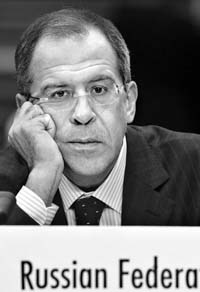Irreconcilable Reactions

As politicians throughout the world continue to comment on the election crisis in Ukraine, Moscow continues to pollute the information space with disapproving remarks directed at the Ukrainian opposition. In contrast, Western nations applaud the democratic processes underway in Ukraine. It is not unlikely that Russia will soon revise its position to reflect the significant changes taking place as the two sides work to defuse the political crisis. In any case, Russia will have to reckon with both the political breakthrough in parliament last week and the upcoming rerun of the runoff election.
So far the Russian leadership is sticking to its old line. Last week Russian Duma Speaker Boris Gryzlov, one of the international mediators negotiating a settlement of the Ukrainian crisis, said that what the opposition is doing in Ukraine “is without a doubt forceful pressure.The blockade of government institutions and central Kyiv are well thought out and prearranged forceful actions,” he said, adding: “In brief, the entire post-electoral process in Ukraine is taking place beyond the pale of legitimacy on the pretence that some decisions are being made owing to political expediency.” Clearly, Russia’s expectations of the Ukrainian elections have not been fulfilled. Meanwhile, Moscow has yet to signal its willingness to tone down its previous comments and begin a dialog with the other party to the conflict. Early last week President Vladimir Putin made such an attempt, saying that Russia is ready to cooperate with any publicly elected leader of Ukraine. However, the Kremlin’s master went on to voice his reservations and, in effect, disavow his earlier statement. In particular, he criticized attempts by Ukraine’s opposition “to bring the current legislation into line with their interests.” “If every time attempts are made in the post-Soviet space to bring current legislation into line with a certain situation or political force, this could destabilize a major region in the world,” Putin said, adding: “I consider such attempts to be counterproductive.” Notably, even those politicians who until recently refrained from criticizing Russia have commented on President Putin’s excessive concern with the Ukrainian revolution.
EU High Commissioner for Common Foreign and Security Policy Javier Solana, an immensely experienced diplomat nicknamed the “minister of hugs and smiles,” said that in warning the West against interfering in Ukraine’s internal affairs, President Putin “went too far.” In an interview with the French Europe 1 radio station, Solana said, “This expression went too far. Europe’s concern is to have a fair electoral process, well run and without fraud. We don’t have a candidate. During his second mandate Putin became more open and perhaps more decisive, and he is more concerned about his neighbors: such countries as Ukraine, Moldova, and Georgia have become the objects of President Putin’s concern more now than ever before,” Solana said. He also pointed out that Russia “has no right to interfere in Ukraine’s internal affairs, and neither do we.”
Georgia’s Foreign Minister Salome Zurabishvili also commented on the problem of external pressure on Ukraine. In an interview with the French newspaper Le Monde she said that what is happening in Ukraine “changes everything. The real question is whether the Russians will learn the right lessons and understand that they can no longer dominate and that a return to the past is impossible.” The Georgian foreign minister added pointedly: “The Russians are thinking about reverting to their imperialistic illusions, while the Europeans are vacillating between indifference and fear of intervening.” Zbigniew Brzezinski, former US National Security Advisor, views the influence of the Ukrainian revolution on post-Soviet metamorphoses in similar terms. In his view, the current situation in Ukraine is “in the final phase of post-imperial consolidation” and there are only two alternatives: either restoring the empire and dictatorship or transforming into a democratic society. Brzezinski, who is the author of world famous geopolitical studies, believes that the Ukrainian revolution will soon spread to Russia, Belarus, Moldova, and the former Soviet republics of Transcaucasia and Middle Asia.
Meanwhile, US officials are continuing to appease the Russian leadership. US State Department Deputy Spokesman Adam Ereli has requested journalists not to exaggerate the differences between Moscow and Washington over the situation in Ukraine. Without mentioning Russia, US Secretary of State Colin Powell expressed his categorical disagreement with those governments that believe that the activity of the OSCE is based on double standards and constitutes interference in the internal affairs of Ukraine. As he put it, the rhetoric about spheres of influence is outdated, and no one is offering Ukrainians the possibility to choose between East and West. It is about their ability to choose their leadership and their friends in an independent fashion.
INCIDENTALLY
The meeting of the Ukraine-NATO Commission, slated for last Friday in Brussels as part of the North-Atlantic council of the alliance, was cancelled. “There will be no meeting at the ministerial level,” the press service of NATO headquarters in Brussels told Interfax-Ukraine last week. However, the press spokesman did not rule out a meeting of ambassadors, regardless of the fact that “such a meeting was held several days before.” According to the NATO press service, the NATO council approved this decision, which is not a “boycott of Ukraine.” “This is due to the political situation in the country,” the press spokesman said, adding that the meeting of the Ukraine-NATO Commission will be held later. “Tomorrow is not the best day to hold it,” he said, referring to December 10.






